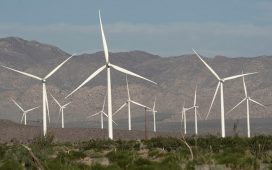Climate extremists draw attention across developed countries with their criticism of today’s energy supply and the living standards it supports. Members of Extinction Rebellion have even protested by standing on top of commuter trains in London, delaying workers on the morning journey to work. As they were angrily pulled off the train so people could get on with their lives, few could feel much sympathy.
If you live in London or New York, it’s convenient to protest there even if your ire is misdirected. Developed countries are generally curbing emissions—nowhere near enough to meet the Paris Accord, but at a pace that reflects popular opinion on the topic. Support for a radical overhaul of our energy systems is shallow—wind and solar remain fringe, and are obviously more expensive than our existing energy supply or they’d already be providing most of it. The great tragedy of renewables is that their hyped-up potential leads extremists to believe no other solutions are required. So they oppose nuclear energy or substitution of natural gas for coal, and don’t push for other practical solutions such as greater government R&D into cleaner use of fossil fuels. Their impractical extremism allows moderates to ignore them.
Public policy in developed countries isn’t aligned with the recommendations of the UN’s Intergovernmental Panel on Climate Change (IPCC), because the votes aren’t there. No developed county is rated any better than “Insufficient” on Climate Action Tracker’s scorecard of action versus the IPCC’s goal of limiting global warming to 2 degrees celsius above preindustrial levels.

INNER MONGOLIA, CHINA: Steam and smoke from waste coal and stone rises after being dumped next to an … [+]
China produces 29% of the world’s CO2, a share that is rising. Their stated goal is to continue their growth in emissions through 2030. China burns half the world’s coal. Western environmental extremists are pursuing trivial objectives by protesting new natural gas pipelines in New York, or impeding London’s public transport (isn’t electric mass transit much more desirable than having everyone drive to work?). They should be dedicating whatever political influence they have to accelerating energy change in China. Developing countries are better able to shift to cleaner energy more quickly, because they’re adding capacity. If China phased out coal use in favor of natural gas, that would lower greenhouse gas emissions (GHGs) by 17%, an enormous contribution.

Smoke billows from smokestacks and a coal-fired generator at a steel factory on November 19, 2015, … [+]
America has such abundance of natural gas that the companies drilling for it are facing financial ruin. China already plans to double the power sector’s use of natural gas, from 7.5% to 15%, by 2030. Why not take it higher still?
The absence of criticism of China implicitly accepts that they should be allowed room to increase emissions in order to raise living standards. Higher energy use is directly linked to better quality of life, better health outcomes and increased longevity. By focusing their criticism in the developed countries where they comfortably live, and ignoring the world’s biggest source of GHGs, climate extremists are advocating lower living standards here to accommodate rising living standards in emerging Asia.
Perhaps that’s why actual results in combating climate change are coming up so short. A vocal minority on the fringe advocates wholesale change of our economies, goals that are easily ignored because they have so little support. Serious efforts to confront the issue need to focus on practical solutions—greater use of nuclear energy; phasing out of coal for natural gas; increased government R&D into all forms of cleaner energy, including the fossil fuels that predominate because they work; and pressure on China, the world’s biggest emitter.







